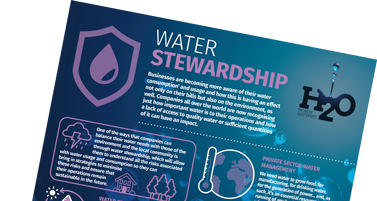Start saving
Water Stewardship | Call us on: 0845 658 0948
Email us: info@h2obuildingservices.co.uk
Businesses are becoming more aware of their water consumption and usage and how this is having an effect not only on their bills but also on the environment, as well. Companies all over the world are now recognising just how important water is to their operations and how a lack of access to quality water or sufficient quantities of it can have an impact.
One of the ways that companies can balance their water needs with those of the environment and the local community is through water stewardship, which will allow them to understand all the risks associated with water usage and consumption so they can bring in strategies to minimise these risks and ensure that their operations remain sustainable in the future.
Water stewardship explained
Where businesses are concerned, stewardship should be viewed as a way of continuing to make improvements where water usage is concerned, while reducing the water-related impacts of their operations.
Stewardship is also a company’s commitment to managing shared water resources sustainably through collaboration with governments, local communities, other businesses and non-government organisations.
Becoming aware of the debates around water in terms of the economy and the environment is the first step towards stewardship, and companies will also need to gain a deeper understanding of their own individual water footprint and what dependencies they have on the resource right across their entire supply chain.
Action within the company can then be taken to address the issue, putting plans and targets in place to ensure more sustainable use of water.
There are very real business benefits associated with water stewardship, including good water quality, effective water governance that ensures all water users receive a fair allocation, and sustainable water balance.
In addition, business risks related to water will be reduced through the minimising of economic, environmental and social impacts. Companies will also be able to prepare themselves properly for periods of drought, as well as making cost savings associated with water efficiency.
Private sector water management
We need water to grow food, for manufacturing, for drinking water, for the generation of power… and, as such, it’s an essential resource to the running of any business, no matter what industry said business is in. Unfortunately, while it’s an essential resource it is also a limited one, and many places around the world are now experiencing issues related to water stress and scarcity.
As demand for water increases, coupled with climate change and global warming, communities will feel the impact of water shortages – so prioritising the sustainable usage of water is a must.
So what can the private sector do to help safeguard this resource for future generations and ensure that it can continue to do business as usual?
Introducing smart meters on your site is an essential step towards being more responsible with water use across industry. Automated meter reading works by continuously monitor water usage across your site, allowing issues to be identified quickly and water-saving solutions adjusted as appropriate and in line with a business’s evolving needs.
Setting a strategic framework in place is also key, introducing new targets and metrics to help you track progress and performance so you can drive improvements where water risks are concerned.
Companies in some industries could also use wastewater more effectively, such as those in the agriculture sector. Effluent could be treated in such a way so as to allow it to be reused for irrigation, for example.
Call our expert consultancy team today on 0845 658 0948 alternatively, you can email us at info@h2obuildingservices.co.uk
Water Stewardship – H2O Building Services – Infographic
Businesses are becoming more aware of their water consumption1 and usage and how this is having an effect not only on their bills but also on the environment, as well.
